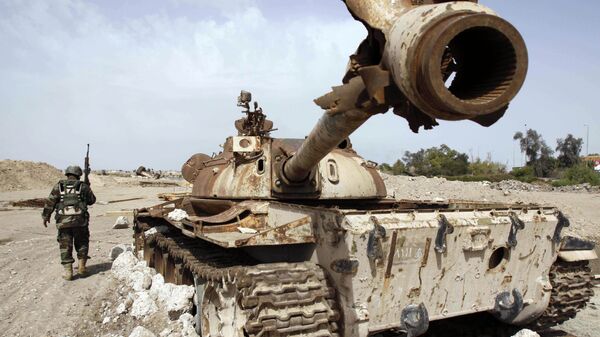In an interview with Sputnik, the journalist recalled that initially, Italy had no plans to join the US-led coalition’s 2003 invasion of Iraq, but did so following pressure from the United States and the United Kingdom. Meanwhile, most sources estimate the number of dead during the Iraq war at anything from 150,000 to half a million.
Radio Sputnik discussed the US-led invasion of Iraq fifteen years ago with Dr. Ronen Zeidel, an Iraq analyst with the Moshe Dayan Center at Tel Aviv University.
Sputnik: What can you say about the consequences of the US-led invasion of Iraq fifteen years ago?
Dr. Ronen Zeidel: In terms of the lessons of the invasion, this was the last of the major invasions by the US anywhere in the world. And this is also the last of human rights motivated interventions worldwide. You know, that it is very easy to enter a war but you don’t know how it ends.
But in the American case, they could have known how it will end, still they decided on the intervention and it ended up not the way they actually wished. So because, I think, the planning of the day after was somehow lacking.
Sputnik: Do you think the US really had a plan when they went into Iraq? I mean it all started because there were so-called weapons of mass destruction.
Dr. Ronen Zeidel: I’m not an expert in American politics but I think that the Americans planned the military intervention very well and it was very easy; they did not plan the day after, they thought that Iraqis would handle things all by themselves, but this was the source of the problem.
Sputnik: Can you describe situation in Iraq right now today: economically, politically, socially, from all aspects? What is Iraq today?
Dr. Ronen Zeidel: Iraq today is a parliamentary democracy. This model of political system was imported and to a certain extent imposed on Iraq, which of course required some preparation and I think that every Iraq experience during the last fifteen years was much of necessary labor pains that were around these preparations for parliamentary democracy.
Iraq is a functioning parliamentary democracy and less than a month from now we are having the fourth elections in Iraq which, you know, these things happen every four years in Iraq: there’s a parliament, there’s a cabinet, there’s a prime minister who is rather successful.
The country has come out of several very, very grave political and security crises which should be mentioned. Economically, the output of oil is all time high now, Iraq is one of the major oil exporters and that the output of oil is all time high but the prices are very low, so that doesn’t really solve the economic problems that Iraq inherited before 2003 and were aggravated by warfare and the security situation and the Daesh period all up to 2017.
Sputnik: So is Iraq better off now than it was before the invasion?
Dr. Ronen Zeidel: That’s a very difficult question to say. I believe that Iraq is cursed by that famous Chinese curse of living through interesting times, you know, may you live in interesting times is a very, well known Chinese curse; and in Iraq times have always been interesting. I believe that at the end of the day if you ask me who benefited from the American invasion, that’s a very good and very difficult question to answer.
Sometimes I think who benefits and I don’t think I can point at a sector or a state or an ethnicity or a people or a person who benefited from the American intervention, certainly not the USA itself or the Shiites or the Kurds.
I think that the only thing that benefited from the American intervention, this is something that you in Russia possibly knows all too well, is the Iraqi national identity. You know, that sometimes national identity claims a lot of human sacrifices and that, I think, is what happened to the Iraqi national identity. This is for making Iraq a better place to live, eventually.
Sputnik: What about the humanitarian crisis? I mean a hundred people killed every day, that’s a huge number, there’s four million people displaced …
Dr. Ronen Zeidel: I don’t think it’s a question of blame. I called it before labor pains and necessary labor pains, great transformations come with a price and the price is a kind of labor pains which is necessarily painful, but necessary. We cannot actually blame any external factor for whatever happened in Iraq. We can blame the Americans for the American call for that the intervention also had, I mean four thousand American soldiers were killed…
Sputnik: But a hundred people die every day. Some people are saying the population is living in poverty, now the cultural heritage was destroyed because the coalition did not protect Iraq’s buildings, the art and everything, ancient culture that was just looted and destroyed and stolen: the National Library, the National Museum, other cultural institutions, they were all badly damaged right away pretty much in the early days of the occupation.
Dr. Ronen Zeidel: By Iraqis. This was inter-Iraqi warfare. Most of what happened was inter-Iraqi warfare and I don’t even blame the Iraqis for that, because this was a major transformation, you can talk about a revolution that happened in Iraq in 2003; of course it was instigated by foreign intervention but this was a revolution and it set Iraq on a very different course than it used to be before that.
The views expressed in this article are solely those of Dr. Ronen Zeidel and do not necessarily reflect the official position of Sputnik.



